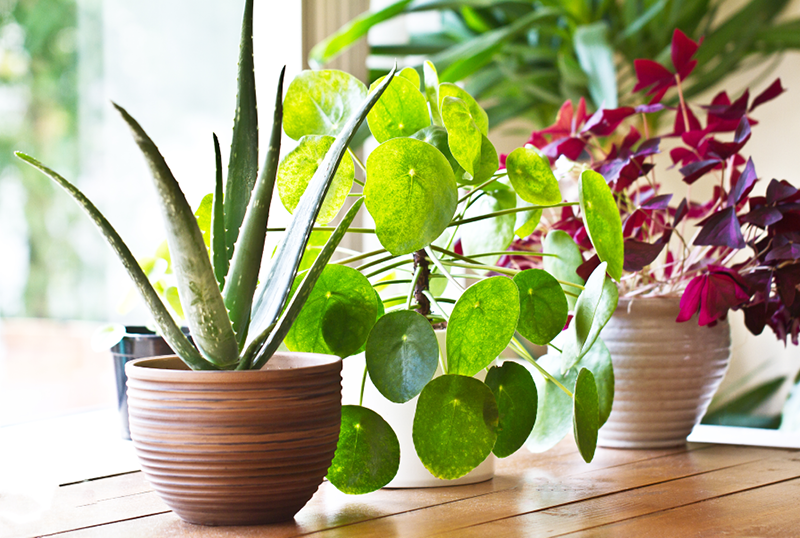
7 Indoor Plants That Purify Your Air
We spend a significant portion of our lives indoors, whether it's at home, work, or school. Unfortunately, indoor air quality can often be worse than outdoor air due to pollutants like dust, mold, and harmful chemicals. This is where the power of nature comes in!
Introducing indoor plants can dramatically improve air quality, creating a healthier and more refreshing environment. These natural air purifiers not only enhance the aesthetics of your space but also contribute to your overall well-being.
In this blog post, we'll explore 7 of the best indoor plants known for their air-purifying abilities. Get ready to breathe easier and bring a touch of nature indoors!
1. The Mighty Snake Plant (Sansevieria)
- Air-Purifying Powerhouse: The snake plant, also known as Mother-in-Law's Tongue, is a true champion when it comes to air purification. It effectively removes toxins like formaldehyde, benzene, and xylene from the air.
- Low-Maintenance Marvel: This hardy plant thrives in neglect. It requires minimal watering and can tolerate low light conditions, making it perfect for even the most forgetful plant parents.
- Stylish and Versatile: With its striking vertical growth and unique foliage, the snake plant adds a touch of elegance to any room. It comes in various shapes and sizes, from tall and slender to short and spiky.
2. The Elegant Peace Lily (Spathiphyllum)
- Moisture Master: The peace lily is renowned for its ability to increase humidity levels, which can be beneficial during dry winter months. It also effectively removes toxins like formaldehyde, benzene, and trichloroethylene.
- Graceful and White: This plant boasts beautiful, white, and long-lasting blooms that add a touch of elegance to any space.
- Low-Light Lover: The peace lily thrives in low-light conditions, making it ideal for rooms with limited natural light.
3. The Resilient Spider Plant (Chlorophytum comosum)
- Air-Purifying Prolific: The spider plant is a prolific air purifier, effectively removing toxins such as formaldehyde, xylene, and benzene from the air. It also releases oxygen, making it a great addition to bedrooms.
- Easy to Propagate: This plant is incredibly easy to propagate. Simply allow the "spiderettes" (baby plants) to grow and root, then pot them up and share them with friends or family.
- Versatile and Child-Friendly: The spider plant is non-toxic to pets and children, making it a safe and family-friendly option.
4. The Energetic English Ivy (Hedera helix)
- Mold and Dust Fighter: English ivy is highly effective at removing mold spores and dust particles from the air. It can also help to reduce airborne allergens.
- Versatile Climber: This versatile plant can be trained to climb trellises or allowed to trail gracefully from hanging baskets.
- Air-Purifying Champion: Studies have shown that English ivy can significantly reduce airborne mold spores, making it beneficial for individuals with allergies or asthma.
5. The Hardy Boston Fern (Nephrolepis exaltata 'Bostoniensis')
- Natural Humidifier: The Boston fern is an excellent natural humidifier, adding moisture to the air and combating dryness, especially during the winter months.
- Toxins Be Gone: This fern effectively removes toxins such as formaldehyde and xylene from the air.
- Graceful and Lush: The Boston fern adds a touch of lush greenery to any space with its cascading fronds.
6. The Elegant Rubber Plant (Ficus elastica)
- Air-Purifying Giant: The rubber plant is a large, leafy plant that effectively removes toxins such as formaldehyde and benzene from the air.
- Low-Maintenance Gem: This plant is relatively easy to care for and can tolerate low light conditions.
- Stylish Statement: The rubber plant makes a bold statement with its large, glossy leaves and can add a touch of tropical elegance to any room.
7. The Fragrant Gardenia (Gardenia jasminoides)
- Sweet-Scented Air Purifier: The gardenia is not only a beautiful flowering plant but also an effective air purifier. It removes toxins such as benzene and trichloroethylene from the air.
- Stress-Reducing Scent: The fragrant blooms of the gardenia have been shown to reduce stress and promote relaxation.
- Requires a Little TLC: While slightly more demanding than some other plants on this list, the gardenia is well worth the extra effort with its stunning blooms and sweet fragrance.
Choosing the Right Plants for Your Home
When selecting indoor plants for air purification, consider the following factors:
- Lighting Conditions: Different plants have varying light requirements. Choose plants that thrive in the lighting conditions of your specific room.
- Space Availability: Consider the size and growth habits of the plant to ensure it fits comfortably in your chosen space.
- Pet Safety: If you have pets, choose non-toxic plants to avoid any potential health risks.
Beyond Air Purification: The Benefits of Indoor Plants
- Reduced Stress and Anxiety: Studies have shown that interacting with plants can reduce stress levels and improve mood.
- Increased Productivity: The presence of plants in the workplace has been linked to increased productivity and creativity.
- Improved Cognitive Function: Studies suggest that indoor plants can improve cognitive function and memory.
- Enhanced Aesthetics: Indoor plants add beauty and life to any space, creating a more inviting and relaxing atmosphere.
Bringing Nature Indoors: A Step-by-Step Guide
- Choose Your Plants: Select plants that are well-suited to your lighting conditions, space limitations, and personal preferences.
- Select the Right Pots: Choose attractive pots that complement your decor and provide adequate drainage.
- Potting Mix: Use a well-draining potting mix specifically designed for indoor plants.
- Water Wisely: Water your plants regularly, but avoid overwatering, as this can lead to root rot.
- Provide Adequate Light: Place your plants in locations that receive the appropriate amount of sunlight.
- Monitor for Pests and Diseases: Regularly inspect your plants for pests and diseases, and take appropriate action if necessary.
Call to Action
Incorporating indoor plants into your home or workspace is a simple yet effective way to improve air quality, enhance your well-being, and create a more vibrant and refreshing environment.
So, why not take the plunge and bring a touch of nature indoors? You'll be amazed at the difference it can make!
